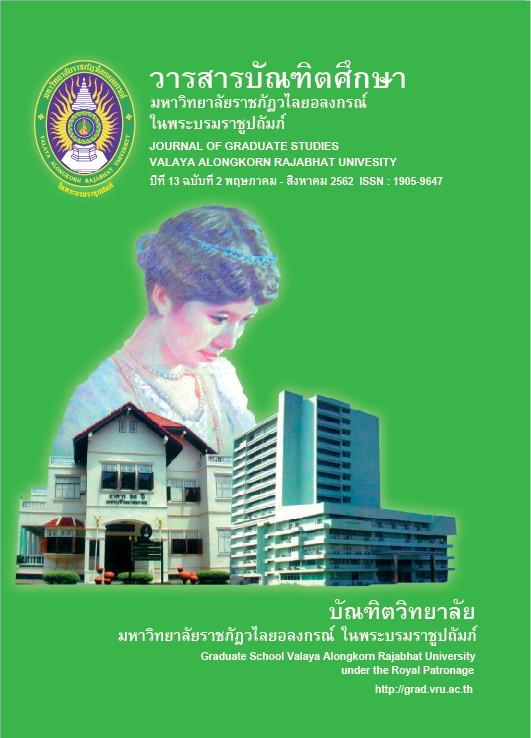STORY TELLING ATIVITIES THROUGH A LARGE STORY BOOK TO PREMOTE SPEAKING SKILLS FOR EARLY CHLDHOOD IN THE 21st CENTURY
Main Article Content
Abstract
This research aims to 1) examine the efficiency of storytelling activities through the large story books which the efficiency was 80/80, 2) compare speaking skills of early childhood using storytelling, and 3) study the satisfaction of storytelling activities by using a large story book of preschool children.The samples used in this research are multi-step random sampling. By lottery method in the following lottery, select educational area, Pathumthani Primary Educational Service Area Office then pick the lottery, choose the school, Wat Nimit School lottery, select the kindergarten class 3 age range 5-6 years, number 1 classroom, can sample groups of 25 people to be a sample group. Tools used in this research. The storytelling activities were organized by using a large story book with the consistency index (IOC) between 0.67-1.00. Test for speaking skills of young children before and after activities the confidence value is equal to .87. Test for speaking skills of young children before and after activities the confidence value is equal to .87 and the satisfaction measure for organizing storytelling activities using a large story book of preschool children. Research design was one-group pretest-posttest design. Data were analyzed by using dependent Samples t-test.
The research result were summarized as follows 1) Storytelling activities using 5 large stories books. To measure vocabulary in speech and sentence in the story by organizing activities every Wednesday at 12.30-12.45 pm for 15 times. Based on the results of the storytelling activities using the big story book with efficiency (E1/E2) equal to 76.48 / 83.00 which meets the criteria. 2) Early childhood speaking skills after learning through storytelling activities was higher than before learning through storytelling activities at the .05 level of significance, and 3) Early childhood children are satisfied with storytelling activities through large children's story books at the high level ( = 2.90 and S.D. = 0.37).
Article Details

This work is licensed under a Creative Commons Attribution-NonCommercial-NoDerivatives 4.0 International License.
บทความทุกเรื่องได้รับการตรวจความถูกต้องทางวิชาการโดยผู้ทรงคุณวุฒิ ทรรศนะและข้อคิดเห็นในบทความ Journal of Global of Perspectives in Humanities and Social Sciences (J-GPHSS) มิใช่เป็นทรรศนะและความคิดของผู้จัดทำจึงมิใช่ความรับผิดชอบของบัณฑิตวิทยาลัย มหาวิทยาลัยราชภัฏวไลยอลงกรณ์ ในพระบรมราชูปถัมภ์ กองบรรณาธิการไม่สงวนสิทธิ์การคัดลอก แต่ให้อ้างอิงแหล่งที่มา
References
Kaeokangwan, S. (2004). phāsā læ khwāmkhit rao khit dūai phāsā [Language and ideas we think with language]. Bangkok: Chulalongkorn Universiti.
Naeobut, R., & Rangsibowonkun, S. (2013). kānphatthanā thaksa kān fang læ kān phūt khō̜ng dek pathommawai dōi chai kitčhakam kān lao nithān phư̄nbān [Developing listening and speaking skills of early childhood by using folk Storytelling activities]. Journal of social academic. 7(2), 1.
Niamhom, N. (2007). kānčhat prasopkān phư̄a songsœ̄m phatthanākān thāng phāsā samrap dek pathommawai [Arranging experiences to promote language development for early childhood]. Retrieved from https://www.nareumon.com/index.php?option=com
Panich, W. (2012). withī sāng kān rīanrū phư̄a sit nai satawat thī yīsipʻet [The way to create learning for students in the 21st century]. Bangkok: Munnithisotsisaritwong.
Phinyoanantaphong, S. (2006). kānphatthanā khunnatham khō̜ng dek pathommawai dūai withī sō̜n dōi chai chut nithān chādok [Moral development of early childhood through teaching using Jataka storytelling]Bangkok: Srinakharinwirot University.
Rotkhlai, M. (n.d.). kānphatthanā dek læ khrō̜pkhrūa nai satawat thī yīsipʻet [Child and FamilyDevelopment in the 21th Century]. Retrieved from https://taamkru.com/th.
Saiwan, A. (2009). ʻēkkasān prakō̜p kān banyāi [Language lecture notes for early Childhood]. Lopburi Educations Service Area Office 2. Lopburipratom.
Saiyot, I., & Saiyot, A. (1998). theknik kānwičhai thāngkān sưksā [Educational research techniques]. 4th ed. Bangkok: Suwiiriyasan.
Silakon, N. (2012). khwāmsāmāt thāngkān phūt khō̜ng dek pathommawai thī dai rap kānčhat kitčhakam lao nithān prakō̜p hun [Speaking ability of early Childhood children who have been organized]. Fairy tales Master’s thesis. Srinakharinwirot University.
Singsawat, A. (2008). dek tit kēm phai rāi lōk sai bœ̄ [Children addicted to cyber threat games]. Retrieved from https://www.thaihealth.or.th/node/4118.
Suphapholsiri, C. (2008). kānsưksā khwāmsāmāt thāng phahu panyā khō̜ng dek pathommawai thī dai rap kānčhat kitčhakam kān thā nangsư̄ lem yai [A study of the intelligence ability of early childhood children who have been organized Big book writing activities]. Bangkok: Srinakharinwirot University.
Tantipalajiva, K. (2004). kānčhat kitčhakam kān rīanrū samrap dek pathommawai [Learning activities for preschool children]. Bangkok: Edison Press Progress.
Tantipalajiva, K. (2007). rūpbǣp kān rīan kānsō̜n pathommawai sưksā [Early childhood education model]. Bangkok: Mitsamphankrapfik.
Thambowon, N. (1999). kānphatthanā krabūankān khit nai dek pathommawai [Development of thinking processes in early childhood]. Bangkok: Chulalongkorn Universiti.
Traiphu, P. (2013). kānphatthanā phrưttikam kānsư̄sān khō̜ng dek pathommawai dōi kānčhat nangsư̄ lem yai rōngrīan ʻanubān somsakunnā Krung Thēp Mahā Nakhō̜n [Development of Communication Behavior of Early Childhood by Creating Books Big Book, Somsakunna Kindergarten School, Bangkok]. Master’s thesis. Phranakhon Rajabhat University.


